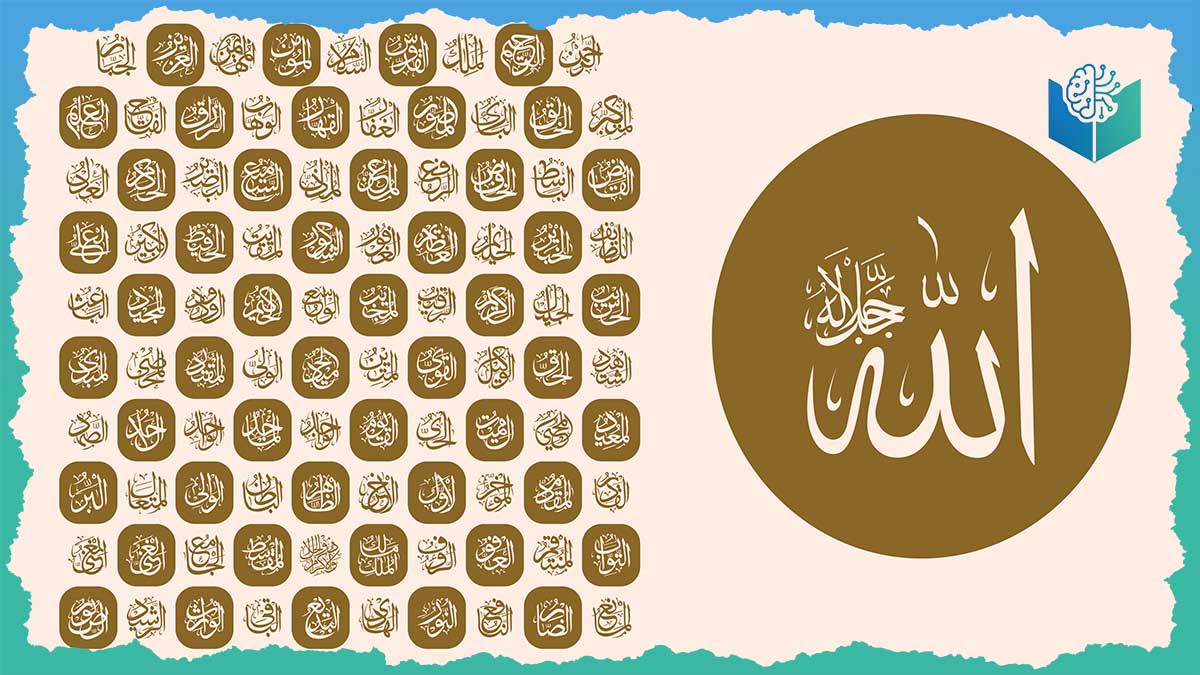The 99 Names of Allah

The 99 Names of Allah, known in Arabic as Asmaul Husna (The Most Beautiful Names), represent the very essence of God in Islam.These divine names are not just labels; they are profound attributes that describe Allah’s incomparable perfection, power, mercy, justice, and wisdom. They give us a glimpse into the boundless nature of God. For Muslims, understanding and reflecting upon Allah’s 99 names is a journey into deeper spiritual insight and a fundamental way to strengthen one’s connection with the Creator. This article explores the Significance of 99 names of Allah, delves into the Benefits of 99 names of Allah, provides guidance on how to memorize 99 names of Allah, and offers a glimpse into the profound Asmaul Husna meaning, enriching one’s understanding of about Islam.
What Are the 99 Names of Allah?
The concept of the Names of Allah is central to Islamic theology, emphasizing God’s uniqueness and transcendence.
Divine Attributes, Not Mere Titles
The 99 Names of Allah are divine attributes that reveal aspects of God’s being. They are mentioned throughout the Quran and in the Sunnah (traditions) of Prophet Muhammad (peace be upon him), showing how important they are in Islamic teachings.
- Beyond Human Comprehension: While these names help us understand Allah, they do not fully encompass His infinite essence, which remains beyond human comprehension. Each name points to a perfect quality, free from any imperfection or limitation.
- Proof from the Quran and Hadith: The Quran states: “To Allah belong the best names, so invoke Him by them.” (Quran 7:180). Prophet Muhammad (PBUH) also said: “Indeed, Allah has ninety-nine names, one hundred less one. Whoever enumerates them will enter Paradise.” (Sahih Bukhari, Sahih Muslim). This emphasizes the immense spiritual reward for those who learn, understand, and live by these names.
The Significance of “Allah”
The word Allah itself is considered the greatest and most comprehensive of all divine names. It is the proper name for the One True God, unique and singular.
- The All-Encompassing Name: It implicitly contains all the other divine attributes. When a Muslim says “Allah,” they are invoking the One who embodies all perfect qualities.
- No Plural or Gender: Unlike the word “god” in English, “Allah” has no plural form, nor does it have a gender, reinforcing the absolute oneness and uniqueness of the Divine.

Exploring the Meaning: Asmaul Husna Meaning
Each of the 99 Names of Allah carries a profound meaning that offers a window into the divine nature, helping us understand God’s perfect qualities. Understanding the Asmaul Husna meaning helps believers cultivate a deeper sense of awe, love, and reverence for their Creator.
Key Categories of Names
The Names of Allah can generally be categorized based on the type of attribute they describe:
- Names of Majesty and Power: These highlight Allah’s absolute power, dominance, and grandeur.
- Ar-Rahman (The Entirely Merciful): Indicates Allah’s vast and all-encompassing mercy that extends to all creation.
- Ar-Rahim (The Especially Merciful): Points to Allah’s specific and active mercy towards His believing servants.
- Al-Malik (The King, The Sovereign Lord): The Absolute Ruler of all existence, free from any needs.
- Al-Ahad (The One): Emphasizes Allah’s absolute oneness and indivisibility.
- Al-Qadeer (The All-Powerful): The One who has perfect power over everything, with no limitations.
- Al-Ghaffar (The All-Forgiving): The One who repeatedly forgives sins, no matter how often they occur.
- Al-Aziz (The All-Mighty, The Irresistible): The One who is powerful and dominant, whose might cannot be overcome.
- Names of Beauty and Grace: These reflect Allah’s kindness, compassion, and gentleness, showing His loving nature.
- As-Salam (The Source of Peace, The Giver of Peace): The One who is free from all defects and gives peace and security.
- Al-Karim (The Most Generous, The Bountiful): The One who is abundantly generous and noble, always giving freely and with honor.
- Al-Latif (The Subtle One, The Kind): The One who is subtle, gentle, and knows the finest details of all things, even those we can’t see or imagine.
- Al-Wadud (The Most Loving): The One who loves His righteous servants and is loved by them, showing a beautiful connection between God and His devout followers.
- Names of Knowledge and Wisdom: These highlight Allah’s infinite knowledge and perfect wisdom, showing just how much He knows and how wise His plans are.
- Al-Alim (The All-Knowing): The One who possesses infinite knowledge of everything, seen and unseen.
- Al-Hakim (The All-Wise): The One who possesses ultimate wisdom in all His decrees and actions, meaning everything He decides and does is perfectly wise.
- As-Sami (The All-Hearing): The One who hears all sounds, without any limitation.
- Al-Baseer (The All-Seeing): The One who sees all things, visible and invisible.
- Names of Justice and Truth: These underscore Allah’s perfect justice and reality.
- Al-Haqq (The Absolute Truth): The One whose existence is undeniably true and whose promises are true, meaning He truly exists and always keeps His word.
- Al-Adl (The Just): The One who is perfectly just in all His judgments and dealings.
This brief overview provides a glimpse into the richness of Allah names. For a complete list of 99 Names of Allah with detailed explanations, numerous resources are available, including comprehensive online platforms.

Benefits and Significance of the 99 Names of Allah
The spiritual and practical Benefits of 99 names of Allah are immense, impacting a Muslim’s faith, character, and daily life.
Deepening Faith and Connection
Reflecting on Allah’s 99 names helps believers grasp the magnificent qualities of their Creator, fostering a deeper, more personal connection.
- Increased Awe and Reverence: Understanding Allah as Al-Azeem (The Most Great) or Al-Jabbar (The Compeller) fills the heart with awe and humility before His majesty.
- Stronger Trust (Tawakkul): Recognizing Allah as Ar-Razzaq (The Provider) or Al-Wakil (The Trustee) strengthens one’s reliance on Him for sustenance and protection. This profound trust is a cornerstone of about Islam, meaning it’s a fundamental and very important part of the religion.
- Enhanced Love: Meditating on Allah as Al-Wadud (The Most Loving) or Ar-Rahman (The Entirely Merciful) cultivates a deep love for the Creator.
Shaping Character and Morality
The Names of Allah serve as a guide for moral and ethical conduct, pushing believers to try and be like these divine qualities as much as they can.
- Emulating Divine Qualities: If Allah is Al-Ghaffar (The All-Forgiving), believers strive to be forgiving. If He is Al-Adl (The Just), then Muslims try to be fair in how they treat others. This active reflection on the Names of Allah transforms inner character.
- Improved Behavior: Knowing that Allah is As-Sami (The All-Hearing) and Al-Baseer (The All-Seeing) promotes mindfulness and encourages virtuous behavior, knowing that every action is observed.
Power of Supplication (Du’a)
Invoking Allah by His beautiful names is a powerful way to make supplication, helping your prayers feel more direct and meaningful.
- Specific Requests: When asking for forgiveness, one might say, “Ya Ghaffar (O All-Forgiving), forgive me.” When seeking provision, “Ya Razzaq (O Provider), provide for me.” This direct and specific invocation strengthens the du’a.
- Spiritual Comfort: Reciting 99 names of Allah in supplication brings comfort and peace, knowing that one is calling upon the perfect Being who can fulfill all needs and desires. The Power of 99 names of Allah is especially evident in this aspect of prayer.
How to Memorize and Reflect on the 99 Names of Allah
Memorizing the 99 Names of Allah is a virtuous endeavor with immense rewards, as highlighted in prophetic traditions. However, it’s not just about rote memorization; it’s about understanding and internalizing their meanings.

Practical Tips for Memorization
- Break It Down: Don’t try to memorize all 99 names at once. Break them into smaller groups (e.g., 5-10 names per week).
- Recite Regularly: Make Reciting 99 names of Allah a daily habit. After prayers, before sleeping, or during moments of reflection, you can say them.
- Use Visual Aids: Create flashcards with the Arabic name, transliteration, and meaning. Use apps or online tools designed for memorization.
- Learn the Meaning First: Understand the Asmaul Husna meaning before attempting to memorize. This makes the names more memorable and impactful.
- Form Associations: Connect each name to a personal experience, a Quranic verse, or a specific attribute you want to embody.
Living by the Names
True memorization goes hand-in-hand with reflection and application in daily life.
- Contemplate Each Name: Spend time daily reflecting on the meaning of one or two names. How does this attribute of Allah manifest in the world around you? How does it relate to your own life? Think about how you can apply this lesson to your daily experiences.
- Integrate into Du’a: Consciously use the names in your supplications, aligning your requests with the appropriate attribute of Allah.
- Strive to Embody: Seek to develop personal qualities that reflect the divine attributes, such as showing mercy (like Ar-Rahman), being just (like Al-Adl), or being forgiving (like Al-Ghaffar). This transforms the act of memorization into a journey of spiritual growth and character refinement.
Conclusion
The 99 Names of Allah, the Asmaul Husna, are more than just a list of 99 Names of Allah; they are the eloquent expressions of divine perfection, power, and mercy that form the very foundation of about Islam. Understanding their Asmaul Husna meaning not only deepens one’s faith and connection to the Creator but also profoundly shapes one’s character, inspiring virtues like patience, gratitude, justice, and compassion. The Benefits of 99 names of Allah are truly immeasurable, encompassing spiritual growth, moral guidance, and powerful supplication. By committing to how to memorize 99 names of Allah and, more importantly, reflecting upon their significance, believers find a deep spiritual treasure. This helps them feel closer to God and experience the amazing Power of 99 names of Allah in all parts of their lives.
Q&A
What is Allah's favorite name?
Allah's most beloved and comprehensive name is Allah itself, as it encompasses all His perfect attributes. While all His names are beautiful, the Prophet Muhammad (PBUH) stated that the greatest names include Allah, Ar-Rahman (The Entirely Merciful), and Ar-Rahim (The Especially Merciful).
What is Allah's name for wealth?
Allah has names like Al-Ghaniyy (The Self-Sufficient/The Wealthy) and Ar-Razzaq (The Provider) that relate to wealth and sustenance. Al-Mughni (The Enricher) also speaks to His ability to grant richness.
How to memorize all 99 names of Allah?
To memorize all 99 names of Allah, it's best to break them into smaller groups (like 5-10 names at a time) and focus on repetition. Regularly recite, listen to, and even write the names, making sure to understand their meanings as you go.





